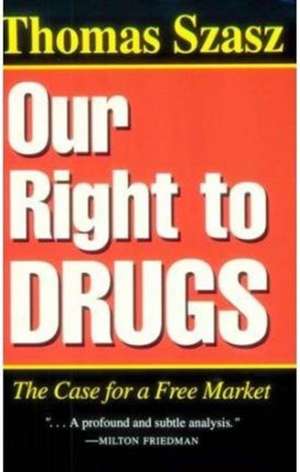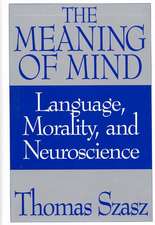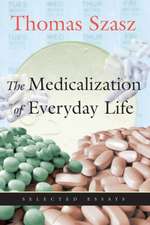Our Right to Drugs: The Case for a Freemarket
Autor Thomas Szaszen Limba Engleză Paperback – 31 mar 1996
In "Our Right to Drugs", Szasz shows how the present drug war started at the beginning of this century, when the US government first assumed the task of protecting people from patent medicines. By the end of World War I the free market in drugs was but a dim memory. Instead of dwelling on the familiar impracticality and unfairness of drug laws, Szasz demonstrates the deleterious effects of prescription laws, which place people under lifelong medical supervision. The result is that most Americans today prefer a coercive and corrupt command drug economy to a free market in drugs. Szasz stresses the consequences of the fateful transformation of the central aim of US drug prohibitions: from protecting the public from being fooled by mis-branded drugs to protecting them from harming themselves by self medication. He emphasises that a free society cannot endure if the state treats adults as if they were truant children and if its citizens reject the values of self-discipline and personal responsibility. After discussing the racial aspects of drug prohibition (eg. drug enforcers are far more likely to accost blacks than whites), Szasz suggests a connection between drug prohibition and the personal dread of the availability of an easy and pleasurable way to commit suicide.
| Toate formatele și edițiile | Preț | Express |
|---|---|---|
| Paperback (1) | 109.10 lei 3-5 săpt. | |
| Syracuse University Press – 31 mar 1996 | 109.10 lei 3-5 săpt. | |
| Hardback (1) | 345.74 lei 6-8 săpt. | |
| Bloomsbury Publishing – 29 apr 1992 | 345.74 lei 6-8 săpt. |
Preț: 109.10 lei
Nou
20.88€ • 21.85$ • 17.27£
Carte disponibilă
Livrare economică 15-29 martie
Specificații
ISBN-10: 0815603339
Pagini: 199
Dimensiuni: 154 x 230 x 14 mm
Greutate: 0.32 kg
Ediția:Syracuse Univ P.
Editura: Syracuse University Press
Textul de pe ultima copertă
Readers will be surprised and enlightened after reading Thomas Szasz's passionate arguments for the legalization of drugs. Rather than dwelling on the familiar impracticality and unfairness of drug laws, he demonstrates the deleterious effects of prescription laws, which place people under lifelong medical supervision.




























